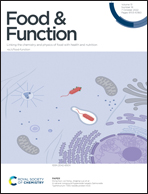The role of wheat embryo globulin nutrients in improving cognitive dysfunction in AD rats
Abstract
Neuroinflammation and intestinal microbiota cause pathological progression of Alzheimer's disease (AD), leading to neurodegeneration and cognitive decline. This study investigates the effects of wheat embryo globulin nutrient (WEGN) on depression, neuroinflammation, and intestinal microbial disorder caused by AD and its protective mechanism on cognitive impairment. Results demonstrated that rats in the WEGN group have lower feed intake but higher body weight than those in the control group. Notably, rats in the WEGN group have a higher number of cross grids and uprights and a smaller amount of fecal particles than those in the control group. Biochemical examinations revealed that rats in the WEGN group had lower expression of interleukin-1β, interleukin-6, and tumor necrosis factor α in hippocampus tissue and the expression of genes and proteins related to the TLR4/MyD88/NF-κB signaling pathway in AD rats was down-regulated compared to those in the control group. The 16S rRNA gene sequencing results demonstrated that WEGN treatment inhibits the increase of Erysipelotrichaceae, Erysipelatoclostridium, Erysipelotrichaceae, Corynebacterium, and Frisingicoccus, and the reduction of Lactobacillus in AD rats. WEGN has potential value as a practical food in alleviating neuroinflammation-related diseases such as AD.



 Please wait while we load your content...
Please wait while we load your content...